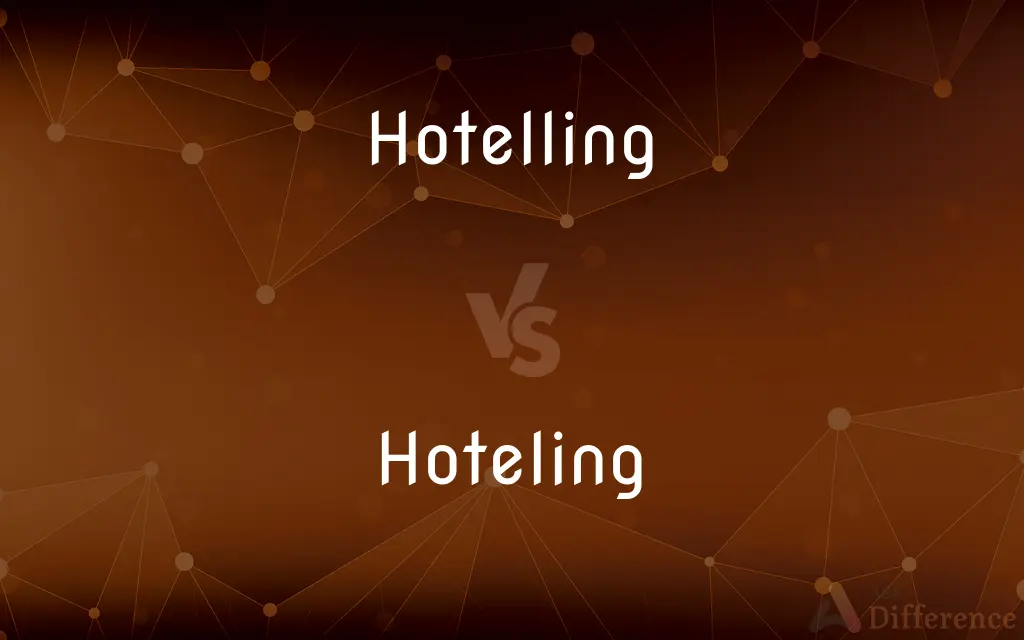Hotelling vs. Hoteling — What's the Difference?
By Maham Liaqat & Fiza Rafique — Updated on April 4, 2024
Hotelling refers to a model in economics, while hoteling is a management practice related to office space.

Difference Between Hotelling and Hoteling
Table of Contents
ADVERTISEMENT
Key Differences
Hotelling is an economic theory named after Harold Hotelling, focusing on how competitors try to maximize their advantage by strategically positioning themselves in relation to each other and to consumer preferences. It's often exemplified by the "beach model" where two ice cream vendors position themselves along a beach to capture the most customers. On the other hand, hoteling is a workplace management practice where employees do not have assigned desks but instead reserve workspace as needed, promoting flexibility and reducing real estate costs.
In the realm of economics, Hotelling's Law explains the tendency of businesses offering similar products or services to cluster together, minimizing differentiation to capture a larger market share. Whereas, hoteling in office management optimizes space usage and encourages remote work, reflecting a shift towards more dynamic and cost-effective workplace strategies.
Hotelling's theory extends beyond the literal market competition, applying to resource depletion rates, political candidate positioning, and more, emphasizing strategic planning over physical products. Hoteling, conversely, addresses the practical aspects of office space utilization, focusing on efficiency and adaptability in the workplace.
The principles of Hotelling have influenced various fields, including environmental economics and political science, by providing insights into competitive behavior and resource management. Hoteling, meanwhile, is part of a broader trend in office management that includes hot-desking and flexible work arrangements, aiming to accommodate changing work patterns and preferences.
While Hotelling's concepts are primarily theoretical, offering a framework for understanding competitive dynamics and strategic positioning, hoteling is a tangible practice implemented by organizations to improve workspace efficiency and adapt to the evolving nature of work.
ADVERTISEMENT
Comparison Chart
Definition
An economic theory about competition and strategic positioning.
A management practice for flexible office space use.
Primary Field
Economics
Workplace management
Focus
Strategic positioning and competition
Space utilization and flexibility
Application Examples
Market structures, resource depletion
Office layouts, remote work facilitation
Theoretical/Practical
Theoretical framework
Practical workplace strategy
Compare with Definitions
Hotelling
Applies to resource depletion, indicating efficient rates of usage.
Hotelling’s rule predicts the rate at which non-renewable resources are extracted.
Hoteling
Part of a broader trend towards flexible workspaces.
Hoteling supports our goal of reducing office space and costs.
Hotelling
Influences political strategies, such as candidate positioning.
Politicians often adopt centrist positions, a concept derived from Hotelling’s theory.
Hoteling
Often enabled by technology for booking spaces.
We use a hoteling app to reserve workstations each week.
Hotelling
An economic principle focusing on competition and location strategy.
The Hotelling model explains why restaurants are located close to each other on a street.
Hoteling
A workplace strategy allowing employees to reserve desks on an as-needed basis.
Our company implemented hoteling to better accommodate remote workers.
Hotelling
A framework for environmental economics regarding natural resource management.
Environmental policies often consider Hotelling’s insights on resource scarcity.
Hoteling
Encourages collaboration by allowing employees to work in different areas.
Hoteling has led to more cross-departmental interaction.
Hotelling
Used in market analysis to understand competitive behaviors.
Hotelling’s analysis helps explain pricing strategies in oligopolies.
Hoteling
Reflects changing work patterns towards mobility and flexibility.
The hoteling system has made our office more adaptable to employees' needs.
Hotelling
The short-term provision of office space to workers who either are temporary or usually work elsewhere.
Hoteling
Hoteling (also hotelling or office hoteling) is a method of office management in which workers dynamically schedule their use of workspaces such as desks, cubicles, and offices. It is an alternative approach to the more traditional method of permanently assigned seating.
Hoteling
Alternative spelling of hotelling
Common Curiosities
How does hoteling benefit a company?
Hoteling can reduce real estate costs, increase workspace flexibility, and support a more mobile and collaborative workforce.
What are the challenges of implementing a hoteling system?
Challenges include managing reservations, ensuring enough space for all employees, and maintaining a sense of personal space and identity within the office.
How do businesses determine if hoteling is right for them?
Companies often consider factors such as the nature of work, employee preferences, potential cost savings, and the goal of fostering a more dynamic and collaborative culture.
Can Hotelling’s theory predict market outcomes?
While it provides a framework for understanding competitive dynamics, predicting specific market outcomes requires considering numerous variables and external factors.
Can Hotelling’s theory apply to online businesses?
Yes, it can apply to online businesses in terms of virtual location and market positioning strategies, especially in highly competitive digital markets.
What is Hotelling’s Law?
Hotelling’s Law suggests that in many markets, competitors will seek to minimize their differentiation to maximize market share, explaining phenomena like the clustering of similar businesses.
How has Hotelling’s theory evolved over time?
Hotelling’s theory has expanded from its initial market competition model to include environmental economics, political science, and other areas where strategic positioning is key.
What distinguishes hoteling from hot-desking?
Hoteling requires employees to reserve a desk in advance, while hot-desking is more spontaneous, allowing employees to choose any available workstation on arrival.
Is hoteling more efficient than traditional office setups?
It can be, as it allows for more effective use of space and resources, catering to the flexible needs of the workforce and potentially leading to cost savings.
How do employees typically respond to hoteling?
Responses can vary; some appreciate the flexibility and variety, while others may miss the consistency and personalization of a permanent workspace.
Share Your Discovery

Previous Comparison
Double vs. Twice
Next Comparison
Snack vs. StarterAuthor Spotlight
Written by
Maham LiaqatCo-written by
Fiza RafiqueFiza Rafique is a skilled content writer at AskDifference.com, where she meticulously refines and enhances written pieces. Drawing from her vast editorial expertise, Fiza ensures clarity, accuracy, and precision in every article. Passionate about language, she continually seeks to elevate the quality of content for readers worldwide.
















































